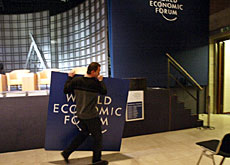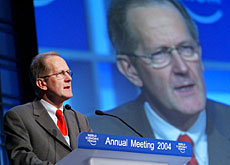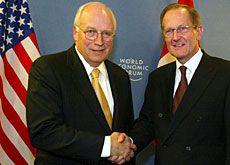Press welcomes cautious optimism in Davos

The Swiss and international media have welcomed the tentative optimism at the five-day gathering of business and world leaders in the Swiss resort of Davos.
The World Economic Forum summit ended on Sunday, with this year’s discussions having focused on security and ways of reviving the world economy.
“Davos is a jewel”, announced the German-language “Tages-Anzeiger”, which lavished praise on the event.
By bringing together heads of business and state, and a broad cross-section of civil society, the summit had managed for once to tackle some “uncomfortable truths”, it said.
Switzerland was also far more visible than in previous years, added the Tages-Anzeiger. The paper noted that the economics minister, Joseph Deiss, pushed for a Swiss role in the rebuilding of Iraq during his tête-a-tête with the US vice-president, Dick Cheney.
Meanwhile the foreign minister, Micheline Calmy-Rey, had attempted to garner support for a Swiss-backed unofficial Middle East peace plan, known as the Geneva Accord.
The “Bund” was less glowing, arguing that by opening the “private managers’ club” to outsiders, the deep gulf between the winners and losers of globalisation had been exposed.
“The big problems debated in Davos remain unresolved,” the German-language paper lamented.
European absence
The French-language “Le Temps” pointed to the glaring absence of European heads of state during the meeting, which had done nothing to boost Europe’s image. Economically and politically, the old continent appeared dwarfed by the United States, the paper said.
Similarly, the “Tribune de Genève” said the 34th WEF summit was dominated by a “triumphant America”, with the three strongest opponents to the war on Iraq – France, Russia and Germany – maintaining a very discreet presence.
The German-language “Basler Zeitung” noted that the overall tone of discussions had been far friendlier than last year, but it was clear that “the storm clouds haven’t yet blown.”
Upturn
The international press, however, pointed to a thawing of relations between Europe and the US.
The “Wall Street Journal” said last year’s split over the war in Iraq had been patched up – albeit shakily. “The truce is uneasy, but the contrast with a year ago is striking,” the business roadsheet remarked.
“Growing hope for globalisation ends forum on upbeat note,” was the headline of the British daily, “The Independent”. The paper said business leaders in Davos had agreed that economic recovery was “here [and] robust” but added that Europe seemed slow to join the party.
Another British daily, “The Guardian”, commented on the overall mood of the summit: “Cautious optimism was the phrase of the week,” the London-based paper said.
But it too noted that the US had dominated both the economic and political debates. The media latched on to efforts by Cheney to “be nice to the Europeans”.
Economic discussions focused on whether the US recovery was strong and sustainable enough to drag the rest of the West out of trouble. “The implication of this was clear: the American model is best,” the paper said.
swissinfo
The 34th World Economic Forum summit ran from January 21 to 25 in Davos.
More than 2,000 political and business leaders attended.
Speakers included UN secretary-general Kofi Annan and US vice-president Dick Cheney.

In compliance with the JTI standards
More: SWI swissinfo.ch certified by the Journalism Trust Initiative


You can find an overview of ongoing debates with our journalists here. Please join us!
If you want to start a conversation about a topic raised in this article or want to report factual errors, email us at english@swissinfo.ch.